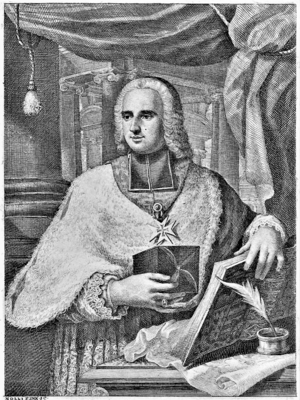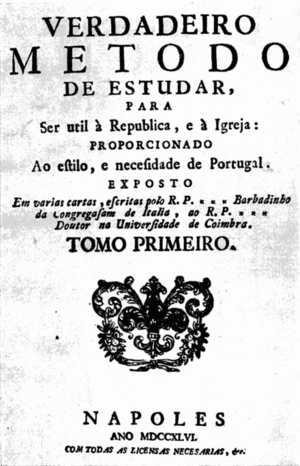Luís António Verney facts for kids
Quick facts for kids
Luís António Verney
|
|
|---|---|

Portrait of Verney, 1791
|
|
| Born | 23 July 1713 |
| Died | 23 March 1792 (aged 78) |
| Occupation | Clergyman |
Luís António Verney (born July 23, 1713 – died March 23, 1792) was an important Portuguese thinker. He was a philosopher, a theologian (someone who studies religion), and a pedagogue (an expert in teaching). Verney was known as an estrangeirado, which means he was a Portuguese person who lived abroad and brought new ideas back home. Many people consider him a key figure of the Portuguese Enlightenment. This was a time when new ideas about science, reason, and education became very popular.
Verney is most famous for wanting to completely change Portugal's education system. At that time, the Jesuits (a religious group) had almost total control over teaching. Verney strongly disagreed with their methods. He wrote a very controversial book called Verdadeiro Método de Estudar (which means "True Method of Study"). It was first published in 1746 without his name on it. Later, his ideas became the foundation for many school reforms. These changes were put in place by the powerful Marquis of Pombal.
Early Life and Education
Luís António Verney was born in Lisbon, Portugal, in 1713. His father, Denys Verney, was from France, and his mother, Maria da Conceição Arnaut, was from Portugal. His family were wealthy merchants. They owned a drugstore in Lisbon. Luís was one of ten children. He was baptized in the Church of Saint Julian.
He started learning at age six with his family's chaplain. He studied Latin, Spanish, French, and Italian. Later, he attended the Jesuit College of Saint Antony the Abbot. He also studied Philosophy with the Oratorians. In 1729, Verney briefly thought about joining a military trip to Portuguese India. However, he changed his mind. By November of that year, he enrolled in the Jesuit-run University of Évora. He finished his studies in Philosophy and Theology there. He earned his Artium Magister degree in 1736.
Studies in Rome and New Ideas
After his studies in Portugal, Verney traveled to Rome. He wanted to earn a doctorate in Theology and Law at the Sapienza University of Rome. While in Rome, he joined the Academy of the Arcadians. This was a group of writers and scholars. He also wrote letters to important thinkers of the Italian Enlightenment. These included Ludovico Antonio Muratori and Antonio Genovesi. In 1741, he was appointed Archdeacon of the Metropolitan Archdiocese of Évora. This was an important church position.
It was during this time that Verney developed his big plan. He wanted to update Portugal's education system. He believed it should be more like the modern systems in other parts of Europe. His book, Verdadeiro Método de Estudar, explained his strong criticisms. It also offered his ideas for change. The book was published without his name in 1746. It quickly caused a lot of debate. This controversy made him lose some influence with King John V.
In his book, Verney argued that grammar should be taught in Portuguese, not Latin. He strongly supported using experimental methods in learning. This was different from just relying on old ideas or authorities. He questioned the power of the Jesuits. They controlled most higher education in Portugal. Verney's book caused a huge argument. Between 1746 and 1757, over forty other books were written to argue against his ideas.
Influence and Later Life
Verney's standing with powerful people grew stronger. This happened when the Marquis of Pombal became the chief minister to King Joseph I. Pombal was also an estrangeirado. After the Jesuits were removed from Portugal in 1759, Pombal made many reforms. A lot of Verney's ideas were put into practice in Portuguese schools.
In April 1768, Verney himself became secretary of the Portuguese Legation in Rome. This was a diplomatic role. However, he got too involved in political issues. This led to him losing his job in 1771. He lived away from Portugal in San Miniato. He was able to return after King Joseph I died. This happened when Queen Maria I took the throne in 1777. In 1780, he became a correspondent for the Lisbon Academy of Sciences in Rome. In 1790, he was named an honorary member of an important government board.
Luís António Verney grew old and became sick. He died in Rome in March 1792. He had been blind and unwell before his death. He dictated his will in August 1791.
Works
Luís António Verney wrote several books and papers. His most famous work is:
- Verdadeiro Método de Estudar, Para Ser Útil à República, e à Igreja (Naples, 1746)
 | Janet Taylor Pickett |
 | Synthia Saint James |
 | Howardena Pindell |
 | Faith Ringgold |


